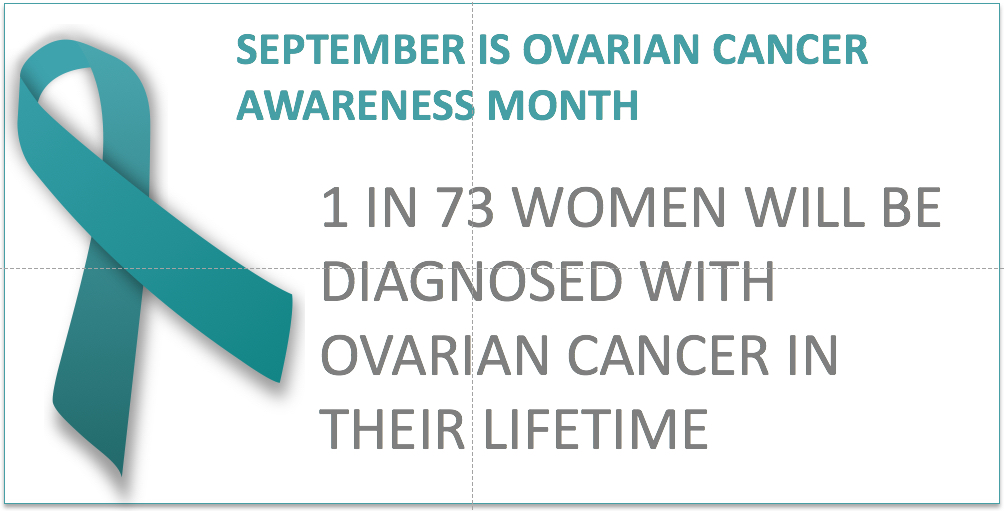Ovarian Cancer Myths
Q. Is it true that there are no symptoms in the early stages of ovarian cancer?
A. Many in the medical community and a number of medical texts still hold the incorrect belief that there are no symptoms in the early stages of ovarian cancer. While the symptoms for early stage ovarian cancer tend to be nonspecific and can mimic nongynecologic conditions, a large national study shows that an overwhelming majority of women diagnosed with ovarian cancer did have symptoms. The most common symptoms reported include: abdominal bloating or discomfort; increased abdominal size or clothes that fit tighter around your waist; increased or urgent need to urinate and pelvic pain. Additional signs and symptoms are: Persistent gas, indigestion or nausea; unexplained changes in bowel habits; unexplained weight loss or gain; loss of appetite; feeling full quickly during or after a meal and pain during sexual intercourse; a persistent lack of energy and low back pain of shortness of breath.
Q. Is it true that a woman who has had her ovaries removed cannot get ovarian cancer?
A. Technically, women who have their ovaries removed cannot get ovarian cancer. There is a rare type of cancer called primary peritoneal carcinoma - a close relative to ovarian cancer that can develop without the ovaries. Primary peritoneal carcinoma is cancer of the abdominal lining. It looks the same as epithelial ovarian cancer under a microscope, it has the same symptoms, it spreads in a similar pattern and it is treated in the same way as ovarian cancer.
Q. Does promoting ovarian cancer information increase anxiety among women?
A. A recent scientific study in Britain dispelled this idea; promoting cancer information really reassures the public. (British Medical Journal 1999) It is important to empower women with the knowledge to take charge of their health and be good advocates.
Source: A. Goff, M.D., Lynn Mandel, Ph.D., Howard G. Muntz, M.D., Cindy H. Melancon, R.N., M.N. 2000. Ovarian carcinoma diagnosis. Cancer 89, No. 10: 1097-0142
Prevention, Risk and Hereditary Factors
Q. Is there any way to prevent ovarian cancer?
A. Currently there is no way of preventing ovarian cancer.
There are, however, several measures that have been found to reduce a woman's risk of developing the disease. Oral contraceptives can reduce the risk of ovarian cancer by fifty percent if taken for at least five years. Research has also shown that pregnancy and breast-feeding significantly reduce ovarian cancer risk. (Br. J. Cancer, March, 2001)
Tubal ligation and hysterectomy reduce risk, though researchers are unclear exactly how. Finally, prophylactic oophorectomy (removal of the ovaries) also reduces the risk. (Gynecologic Cancer Foundation Slide Presentation, 2000) Health professionals recommend that all options be discussed thoroughly with a physician.
Q. Is there an association between Hormone Replacement Therapy and ovarian cancer?
A. The latest interpretation of data resulting from the Women’s Health Initiative study suggests that postmenopausal women who take combined hormone replacement therapy (HRT) continuously may face a higher risk of ovarian cancer. While researchers say the findings shouldn't affect most women's decisions to take HRT to relieve moderate to severe menopausal symptoms, such as hot flashes, the possibility of an increased ovarian cancer risk support recently revised guidelines that call for the conservative use of hormone therapy.
Source: Anderson, G. The Journal of the American Medical Association (Vol 290:1739-1748).
Q. Does the use of talc (talcum powder) as a feminine powder increase the risk of ovarian cancer?
A. A number of past studies found an increased risk of ovarian cancer from talcum powder use, but these studies were considered inconclusive because of limitations in the way data were collected and analyzed. More recent studies, such as one using data from Harvard University’s Nurses’ Health Study in 2000, find no overall risk of ovarian cancer from talc use and only a modest increase in one type of the disease – invasive serous ovarian cancer.
Source: Journal of the National Cancer Institute (Vol. 92, No. 3).
Q. Do fertility drugs increase your risk of developing ovarian cancer?
A. Use of fertility drugs does not increase a woman's risk of getting ovarian cancer. On the other hand, the scientists did find an association between ovarian cancer and certain causes of infertility itself, such as endometriosis.
"Some women who receive fertility treatments develop ovarian cancer because of underlying conditions that cause infertility, not because of the treatments themselves," said Roberta Ness, MD, MPH, of the University of Pittsburgh's School of Public Health.
Q. Is there a link between breast cancer and ovarian cancer?
A. Both breast and ovarian cancer can be caused by mutations in the BRCA1 and BRCA2 genes. Women with a family history of breast and ovarian cancer, or a personal history for either, particularly if diagnosed before age 50, should be aware of increased risk for the other. Women who have had breast cancer before the age of 50 are twice as likely to develop ovarian cancer, as are women who have not. (NCI – What You Need To Know About Ovarian Cancer, 1998) Additionally, ovarian cancer has also been linked to colon cancer (via different genes).
Q. What is endometriosis? Can it cause ovarian cancer?
A. Endometriosis is a chronic and often progressive disease that develops when endometrial tissue, which normally lines the inner surface of the uterus, grows outside of the uterus. These implants occur most frequently in the pelvic region and on the reproductive organs but can appear in other areas, such as the bladder, as well.
In spite of the high prevalence of endometriosis in women, researchers have been unable to determine its cause. Endometriosis can cause pain and scarring, and it is believed that 20 percent to 40 percent of women diagnosed with this chronic disease are infertile. (National Cancer Institute)
Researchers hypothesized that the most likely link between endometriosis and ovarian cancer is the association between endometriosis and infertility. It is well established that ovarian cancer risk is reduced with each pregnancy. Consequently, women who do not bear children, whether by choice or due to infertility issues, are believed to be at greater risk for ovarian cancer.
Source: The Gynecologic Sourcebook, Third Edition.
Q. If a family member has ovarian cancer, can genetic screening determine if other family members will get the disease?
A. Approximately one out of every ten ovarian cancer cases is hereditary.
Most hereditary ovarian cancer can be attributed to two genes, BRCA 1 and BRCA2. Women who inherit a mutation in these genes are at greater risk of developing epithelial ovarian cancer.
A thorough evaluation of family history (i.e., a history of breast, colon, or ovarian cancer) can identify women most likely to have a hereditary cancer risk, and genetic testing can determine if these mutations exist. Although having these mutations increases risk, it does not mean a woman will definitely get the disease. Furthermore, while genetic testing can indicate where there is increased risk and help determine appropriate monitoring, women should consider the psychological and possible insurance ramifications before proceeding with testing. Experts suggest that all genetic testing be done in conjunction with genetic counseling.
Q. What are ovarian cysts?
A. Ovarian cysts are fluid-filled sacs on the surface of the ovary that are quite common in women during their childbearing years. Most cysts result from the changes in hormone levels that occur during the menstrual cycle and the production and release of eggs from the ovaries. Most are harmless and go away on their own. Your doctor will want to keep track of any cyst to be sure that it does not grow and become cancerous. (ACOG Patient Education: Ovarian Cysts, 1996)
Screening Tools, Detection and Treatment
Q. Does an elevated CA 125 level always indicate that ovarian cancer is present?
A. Not always. Although a CA 125 blood test can be a useful tool for the diagnosis of ovarian cancer, in premenopausal women, it is not uncommon for a CA 125 count to be elevated due to benign conditions unrelated to ovarian cancer. Uterine fibroids, liver disease, inflammation of the fallopian tubes and other types of cancer can elevate a woman's CA 125 level. (ACOG Patient Education - 1996) The CA 125 test is more accurate in postmenopausal women. It is also important to note that in about 20 percent of cases of advanced stage disease, and 50% of cases of early stage disease, the CA 125 is NOT elevated, even though there is ovarian cancer present. As a result, the CA 125 is generally one of several tools used to diagnose ovarian cancer. One of the most important uses of the CA 125 test, however, is to evaluate progressive disease and tumor response in patients undergoing treatment, and to monitor the levels of women in remission for evidence of disease recurrence.
Q. What is a clinical trial?
A. Clinical trials are carefully designed research studies that involve people. Clinical trials are conducted to find ways to improve the medical care and treatment that is available to women with ovarian cancer. Some trials test ways to detect and prevent ovarian cancer or its recurrence. There are also clinical trials that study how to improve an ovarian cancer patient’s quality of life during and after treatment.
Q. Who is best trained to treat ovarian cancer?
A. Gynecologic oncologists. Research has shown that the five-year survival rate is greater when the initial surgery is performed by a gynecologic oncologist. (NCI) The initial surgery and staging of ovarian cancer is critical to determining the appropriate course of treatment, and ultimately survival outcomes. A gynecologic oncologist is an ob/gyn who is further trained in oncology to specialize in the diagnosis and treatment of women with gynecologic cancers. To find a gynecologic oncologist in your area, visit the Women's Cancer Network website at www.wcn.org and select "Find a Doc," or call 1-800-444-4441.
Q. If there are no accurate screening tools, how is ovarian cancer diagnosed?
A. An exploratory surgical procedure called laparotomy is generally required for the definitive diagnosis of ovarian cancer. During this procedure, cysts or other suspicious areas must be removed and biopsied. After the incision is made, the surgeon assesses the fluid and cells in the abdominal cavity. If the lesion is cancerous, the surgeon continues with a process called surgical staging to ascertain how far the cancer has spread.
http://www.ovariancancer.org/





Add a Comment3 Comments
Great information.I am sure people would be better aware of ovarian cancer after reading your article.The information on primary peritoneal carcinoma was something new and informative.I have seen women who confuse between diarrhea and ovarian cancer.This would be useful for them.I read an article in the following link which explains a new treatment for ovarian cancer.May be it is useful for the readers.
September 9, 2009 - 3:19amhttp://www.empowereddoctor.com/potential-ovarian-cancer-treatment-seeks-out-tumor-cells
This Comment
When speaking of genetic/familial risks please include Lynch Syndrome. A recent article written by Dr Henry Lynch Sr (published 9/09) can be found at:
http://tinyurl.com/nhsdbv
Thanks.
Sandi Pniauskas
"Following colorectal cancer, the second most frequent cancer in Lynch syndrome is endometrial carcinoma (occurs in 40%–60% of women with the mutation), followed by carcinoma of the ovary (occurs in about 12%–15% of women with the mutation). Based on their study of the evidence, Lindor and colleagues recommend endometrial sampling and transvaginal ultrasonography of the uterus beginning between age 30 and 35. They also recommend transvaginal ultrasonograpy of the ovaries beginning at the same age. We agree with these recommendations, with the caveat that the patient must be fully apprised of the screening limitations for early detection of ovarian cancer, as well as the lack of evidence of a reduction in mortality through endometrial and ovarian screening. The efficacy of prophylactic hysterectomy and bilateral salpingo-oophorectomy in women who have a Lynch syndrome–related germline mutation is supported by evidence-based findings, and this should be offered as an option for cancer prevention after a woman’s family is completed. "
September 3, 2009 - 8:07pmThis Comment
Sandi, thank you for your comment and for sharing this information. Lynch Syndrome is also considered a factor in colorectal cancer.
One study has led to the belief among most medical professionals that a large portion—up to an estimated 20%—of all colon cancer cases may be related to hereditary factors. Two such factors have been specifically identified: familial adenomatous polyposis and hereditary non-polyposis colon cancer (Lynch Syndrome). People with these two diseases are more likely than others to develop colon cancer. Colon Cancer: Common and Curable
For more information, please see:
VIDEO: Dr. Williams - Is Endometrial Cancer Hereditary?
September 3, 2009 - 9:07pmThis Comment